- Home
- Joseph O'Connor
New Irish Short Stories
New Irish Short Stories Read online
New Irish Short Stories
Edited by
JOSEPH O’CONNOR
In affectionate memory of
David Marcus, 1924–2009
Content
Title Page
Dedication
Introduction JOSEPH O’CONNOR
Beer Trip to Llandudno KEVIN BARRY
Winter DERMOT BOLGER
Larry, Lay Down AIFRIC CAMPBELL
Visiting Hours EMMA DONOGHUE
Festus GERARD DONOVAN
Animals RODDY DOYLE
Absence CHRISTINE DWYER HICKEY
Leaving for Kenosha RICHARD FORD
Somewhere in Minnesota ÓRFHLAITH FOYLE
One of Those Stories ANTHONY GLAVIN
Giant JULIA KELLY
Aisling COLUM MCCANN
A Gift for My Mother VIV MCDADE
Chicago Here We Come BELINDA MCKEON
Handmade Wings EOIN MCNAMEE
She Came to Me REBECCA MILLER
Boom MARY MORRISSY
The Blacklight Ballroom PETER MURPHY
The Fuck Monkeys PHILIP O’CEALLAIGH
Goose JOSEPH O’NEILL
Footnote GLENN PATTERSON
Five Entries from a Fictional Diary ANGELA POWER
The Old Regime KEVIN POWER
The News from Dublin COLM TÓIBÍN
The Crippled Man WILLIAM TREVOR
Midnight Blue ELAINE WALSH
Notes on the Authors
About the Editor
Also available from Faber
Copyright
Introduction
DAVID MARCUS, TO WHOSE MEMORY this collection is dedicated, was a poet, a memoirist, a publisher, an anthologist. He promoted the work of so many Irish writers that it would be impossible to list them all here. Those who knew him well – as I did not, alas – remember a man of immense warmth and wit. He was courteous, wry and avuncular in his dealings. He wrote elegant, grammatically impeccable, rather lawyerly letters, on his old-fashioned portable typewriter. In company he was a person of mischief and charm. Nobody will ever do more for Irish literature.
When David Marcus liked your work you were happy, for his standards were high. He ran the New Irish Writing page at the now-defunct Irish Press newspaper for many years, encouraged by others including Anthony Glavin and the heroic Dermot Bolger and a sometimes-unacknowledged champion, Sean McCann. It is fitting that the present collection includes fiction from Glavin and Bolger and from Sean McCann’s son, Colum.
This book offers new short stories from internationally celebrated masters of the form and from writers at the start of promising careers. We have a winner of the American National Book Award, a winner of the Dublin Impac Literary Award, a multiple winner of the Whitbread and a winner of the Booker. We have nominees for other major awards, including the Orange Prize and the Costa, and a couple of Guggenheim Fellows. It was David’s quietly insistent way as an editor to publish the work of talented newer writers among the established. In that sense, and perhaps in others, I have borrowed from the wise inheritance he bequeathed. He might, or might not, have approved of my selections – he could be a tough critic as well as a kindly one, and he had his tastes, as all editors have. But I believe he would have liked the idea of the mix.
I have tried to reflect something of the variety of contemporary Irish writing. The collection offers stories set in Ireland written by authors born in that country and from writers born and raised elsewhere but living here now. I have not been overly focused on passport requirements. If you’re Irish enough to qualify for the Republic of Ireland football team under the one-grandparent rule, or to cheer for it, even ironically, when it’s playing against our friends in England, you’re eligible for a seat on the squad bus. That said, I had to persuade the great Richard Ford, a Mississippian with Cavan blood, that his professorship at Trinity College Dublin and the respect in which his work is held by so many Irish writers of my generation make him one of us and always will. Literature opens citizenships of affection, as every reader knows, and Ireland is in need of them these days. New York film-maker and best-selling novelist Rebecca Miller lives and writes in Wicklow. I thank her for allowing herself to be coaxed on board. Emma Donoghue sent a story from Canada, Philip O’Ceallaigh from Bucharest, Joseph O’Neill and Belinda McKeon from Manhattan and Brooklyn, and Peter Murphy from another country perhaps called The Future. (As Colm Tóibín says, ‘They do things differently there.’) Glenn Patterson, Kevin Power, Gerard Donovan, Eoin McNamee and Mary Morrissy show the punch and extraordinary capaciousness short fiction can have. Viv McDade, Elaine Walsh, Órfhlaith Foyle and Angela Power are impressive talents; it is a pleasure to introduce their work to a wider audience.
The shortest piece is very short; the longest is long. Some stories engage with life outside Ireland, in the traditional outposts of Irish emigration and in newer ones; others engage with the realities of an Ireland convulsed by change in recent years. Several are set in an older, more secretive place that still casts its shadows across our fantasies. A handful of the stories do not allude to Ireland in any way. Indeed, some of the authors whose work appears here would be reluctant to define their work as ‘Irish fiction’ at all and would question what each of those words means. I have tried, if not to destroy categories, to elasticise them a bit. Purists will see much to complain about. But as my Francis Street grandmother was fond of saying, some people are never happy unless they’re slightly miserable. I have tried to bear this in mind.
The short story seems to be experiencing something of a renaissance in post-Celtic Tiger Ireland. Journals such as The Stinging Fly, edited by Declan Meade, have provided a home for dozens of new writers whose exhilarating work, sceptically aware of the pantheon of the past in Irish fiction, has often pushed at boundaries. Brendan Barrington’s fine journal The Dublin Review has published beautiful short stories and essays. Cooperatives of writers have formed themselves up and down the country; the Internet has proved important as a means of getting work out. Self-publishing is no longer always seen as a poor relation. There are more writers’ groups and workshops than ever before. Great credit is due to Ciaran Carty at the Sunday Tribune in Dublin, where the New Irish Writing page now appears monthly, offering short stories and poetry. Indeed, Ciaran Carty has been to my own generation of Irish writers what David Marcus was to several earlier generations: an advocate, a friend and a hero. The Hennessy family, of Cognac fame, should be thanked for sponsoring the literary awards that bear their name, a set of prizes that offer recognition to Irish writers starting out on a road that can be challenging and lonesome. And the publishers of this book must be acknowledged and warmly thanked too. It is hard to think of any London publishing house that has done more to support the Irish short story. Irish publishers might take a leaf from Faber’s book.
Several of the authors whose work is included here have long been among my own touchstones, my Easter Island figures, as a writer, but first as a reader. Others, younger voices, have made it wonderfully evident that Ireland is still a country, for all its innumerable shames, where the empathies involved in the sharing of a story are valued for their possibilities of hope and healing. To make neighbours of William Trevor and Órfhlaith Foyle, of Colm Tóibín and Kevin Barry, of Roddy Doyle, Christine Dwyer Hickey, Julia Kelly and Aifric Campbell, is to raise at least the possibility that we can walk from the tomb of sordor that several of these stories rage against. Some of the testimonies are dark. Others are strange. And while some are bleakly funny, or funnily bleak, I hope there is a refreshing lack of the easily attained laughter that is only grief on a good Irish day. That so many of them manage to find such unearthly beauty in their refusal to flinch is a testament to the mercies of language. We
are surrounded by advertisers, propagandists of the slick, chancers, salesmen, illusionists, liars. In Ireland we have banks with no money, apartment blocks nobody wanted, politicians we don’t trust, an economy in ruins, a church so disgraced by child abuse and cover-up corruption that it must alter itself profoundly or die. We are witnessing the return of the mass emigration that haunts the work of John McGahern, while our leaders encourage us to bleat about how upbeat we are feeling. The Republic is approaching the centenary of its foundation, yet there has never been a time when so many of us weren’t quite sure what Ireland is for. Old certainties are shattered. We got fooled, and we know it. But sometimes, in the Irish sentence, the greatest thing we have ever invented, we glimpse what we yet might be. The arts have brought the consolation of dignity to Ireland at a time when we sorely needed it.
In many of the stories presented here, absence is a presence. And the omissions from any anthology are as interesting as its selections. There are indeed several writers whose work I would have liked to include but on this occasion that wasn’t to be. Some hadn’t a story they felt was ready to face the reader; others were in the middle of a project, wrestling with its demands. Some, unfortunately, don’t write short stories any more, and that tells its own story too. It’s a particular regret that these pages don’t include a story by an immigrant to Ireland from the developing world; hopefully, future such collections will do so. And the work being done in what is sometimes dismissively called ‘genre fiction’ – in crime writing, for example, and in the popular novel and in children’s literature – is often as reflective of the contemporary realities of Ireland as is any Irish novel likely to be reviewed on the London literary pages. But I believe that the writing offered here has something of the clamorous music of Ireland now, the strangeness and yet the beauty of a country that is passing through adolescence, one glance on its painful childhood, another on the horizon, poised somewhere between denial and hope.
David Marcus told me once: ‘Choosing my writers isn’t hard for me. If they have something to say, I love them. The work chooses itself. Then, what it needs is luck. And readers. Always readers.’
Here is a collection of writers with something to say. This reader was convinced and enthralled.
Joseph O’Connor
Dublin, 2010
Beer Trip to Llandudno
Kevin Barry
IT WAS A PIG OF A DAY, AS HOT as we’d had, and we were down to our T-shirts taking off from Lime Street. This was a sight to behold – we were all of us biggish lads. It was Real Ale Club’s July outing, a Saturday, and we’d had word of several good houses to be found in Llandudno. I was double-jobbing for Ale Club that year. I was in charge of publications and outings both. Which was controversial.
‘Rhyl … We’ll pass Rhyl, won’t we?’
This was Mo.
‘We’d have come over to Rhyl as kids,’ said Mo. ‘Ferry and coach. I remember the rollercoasters.’
‘Never past Prestatyn, me,’ said Tom Neresford.
Tom N. – so-called, there were three Toms in Ale Club – rubbed at his belly in a worried way. There was sympathy for that. We all knew stomach trouble for a bugger.
‘Down on its luck’d be my guess,’ said Everett Bell. ‘All these old North Wales resorts have suffered dreadfully, haven’t they? Whole mob’s gone off to bloody Laos on packages. Bloody Cambodia, bucket and spade.’
Everett wasn’t inclined to take the happy view of things. Billy Stroud, the ex-Marxist, had nothing to offer about Llandudno. Billy was involved with his timetables.
‘Two minutes and fifty seconds late taking off,’ he said, as the train skirted the Toxteth estates. ‘This thing hits Llandudno for 1.55 p.m., I’m an exotic dancer.’
Aigburth station offered a clutch of young girls in their summer skimpies. Oiled flesh, unscarred tummies, and it wasn’t yet noon. We groaned under our breaths. We’d taken on a crate of Marston’s Old Familiar for the journey, 3.9 per cent to volume. Outside, the estuary sulked away in terrific heat and Birkenhead shimmered across the water. Which wasn’t like Birkenhead. I opened my AA Illustrated Guide To Britain’s Coast and read from its entry on Llandudno:
‘A major resort of the North Wales coastline, it owes its well-planned streets and promenade to one Edward Mostyn, who, in the mid-19th century …’
‘Victorian effort,’ said John Mosely. ‘Thought as much.’
If there was a dad figure among us, it was Big John, with his know-it-all interruptions.
‘Who in the mid-19th century,’ I repeated, ‘laid out a new town on former marshland below …’
‘They’ve built it on a marsh, have they?’ said Everett Bell.
‘TB,’ said Billy Stroud. ‘Marshy environment was considered healthful.’
‘Says here there’s water skiing available from Llandudno jetty.’
‘That’ll be me,’ said Mo, and we all laughed.
Hot as pigs, but companionable, and the train was in Cheshire quick enough. We had dark feelings about Cheshire that summer. At the North West Beer Festival, in the spring, the Cheshire crew had come over a shade cocky. Just because they were chocka with half-beam pubs in pretty villages. Warrington lads were fine. We could take the Salford lot even. But the Cheshire boys were arrogant, and we sniffed as we passed through their country.
‘A bloody suburb, essentially,’ said Everett.
‘Chester’s a regular shithole,’ said Mo.
‘But you’d have to allow Delamere Forest is a nice walk?’ said Tom N.
Eyebrows raised at this, Tom N. not being an obvious forest walker.
‘You been lately, Tom? Nice walk?’
Tom nodded, all sombre.
‘Was out for a Christmas tree actually,’ he said.
This brought gales of laughter. It is strange what comes over as hilarious when hangovers are general. We had the windows open to circulate what breeze there was. Billy Stroud had an earpiece in for the radio news. He winced:
‘They’re saying it’ll hit 36.5,’ he said. ‘Celsius.’
We sighed. We sipped. We made Wales quick enough, and we raised our Marston’s to it. Better this than to be stuck in a garden listening to a missus. We meet as many as five nights of the week, more often six. There are those who’d call us a bunch of sots but we don’t see ourselves like that. We see ourselves as hobbyists. The train pulled into Flint, and Tom N. went on the platform to fetch in some beef ’n’ gravies from the Pie-O-Matic.
‘Just the thing,’ said Billy Stroud, as we sweated over our dripping punnets. ‘Cold stuff causes the body too much work, you feel worse. But a nice hot pie goes down a treat. Perverse, I know. But they’re on the curries in Bombay, aren’t they?’
‘Mumbai,’ said Everett.
The train scooted along the hot coast. We made solid headway into the Marston’s. Mo was down a testicle since the spring. We’d called in at the Royal the night of his operation. We’d stopped at the Ship and Mitre on the way – they’d a handsome bitter from Clitheroe on guest tap. We needed the fortification: when Real Ale Club boys parade down hospital wards, we tend to draw worried glances from the whitecoats. We are shaped like those chaps in the warning illustrations on cardiac charts. We gathered around Mo and breathed a nice fog of bitter over the lad, and we joshed him, but gently.
‘Sounding a little high-pitched, Mo?’
‘Other lad’s going to be worked overtime.’
‘Diseased bugger you’ll want in a glass jar, Mo. One for the mantelpiece.’
Love is a strong word, but. We were family to Mo when he was up the Royal having the bollock out. We passed Flint Castle, and Everett Bell piped up.
‘Richard the Second,’ he said.
We raised eyebrows. We were no philistines at Ale Club, Merseyside branch. Everett nodded, pleased.
‘This is where he was backed into a corner,’ he said. ‘By Bolingbroke.’
‘Bolingwho?’
‘Bolingbroke, the usurper. Old Dick surrendered for
a finish. At Flint Castle. Or that’s how Shakespeare had it.’
‘There’s a contrary view, Ev?’
‘Some say it was more likely Conwy but I’d be happy with the Bard’s read,’ he said, narrowing his eyes, the matter closed.
‘We’ll pass Conwy Castle in a bit, won’t we?’
I consulted my AA Illustrated.
‘We’ll not,’ I said. ‘But we may well catch a glimpse across the estuary from Llandudno Junction.’
There was a holiday air at the stations. Families piled on, the dads with papers, the mams with lotion, the kids with phones. The beer ran out by Abergele and this was frowned upon: poor planning. We were reduced to buying train beer, Worthington’s. Sourly we sipped, and Everett came and had a go.
‘Maybe if one man wasn’t in charge of outings and publications,’ he said, ‘we wouldn’t be running dry half-ways to Llandudno.’
‘True, Everett,’ I said, calmly, though I could feel the colour rising in my cheeks. ‘So if anyone cares to step up, I’ll happily step aside. From either or.’
‘We need you on publications, kid,’ said John Mosely. ‘You’re the man for the computers.’
Publications lately was indeed largely web-based. I maintained our site on a regular basis, posting beerrelated news and links. I was also looking into online initiatives to attract the younger drinker.
‘I’m happy on publications, John,’ I said. ‘The debacle with the newsletter aside.’
Newsletter had been a disaster, I accepted that. The report on the Macclesfield outing had been printed upside down. Off-colour remarks had been made about a landlady in Everton, which should never have got past an editor’s eye, as the lady in question kept very fine pumps. It hadn’t been for want of editorial meetings. We’d had several, mostly down the Grapes of Wrath.
‘So how’s about outings then?’ I said, as the train swept by Colwyn Bay. ‘Where’s our volunteer there? Who’s for the step-up?’

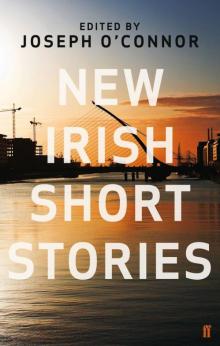 New Irish Short Stories
New Irish Short Stories The Salesman
The Salesman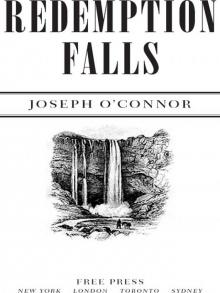 Redemption Falls
Redemption Falls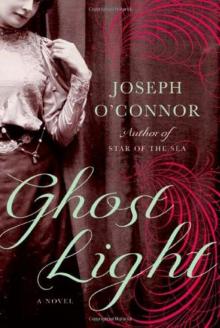 Ghost Light
Ghost Light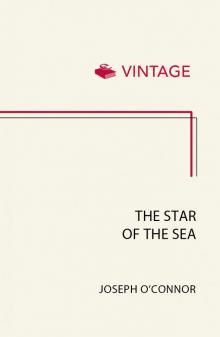 Star of the Sea
Star of the Sea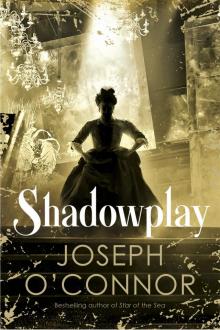 Shadowplay
Shadowplay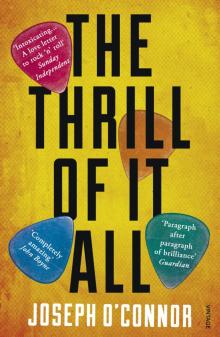 The Thrill of It All
The Thrill of It All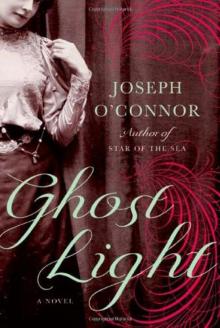 Ghost Light: A Novel
Ghost Light: A Novel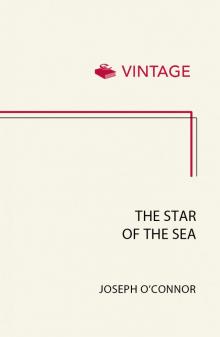 The Star of the Sea
The Star of the Sea